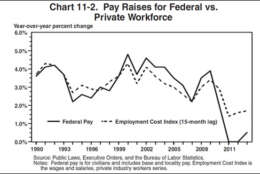Pay
-
Federal Times Editor Steve Watkins, Senior Writer Sean Reilly,and NARFE Legislative Director Julie Tagen will discuss how government employees will be affected by proposed cuts to the federal budget. February 15, 2012
February 15, 2012 -
When you think of federal workers, the term \"swinger\' isn\'t the first thing that pops into your head. But after some of the changes politicians want to make, anything could happen.
February 15, 2012 -
When it comes to figuring out whether federal workers are overpaid or underpaid both sides need to remember the basic carpenters rule: Measure twice, cut once. How come? Sometimes when doing complex math even the experts get it wrong, Senior Correspondent Mike Causey says — even rocket scientists.
February 15, 2012 -
The personnel proposals included in the 2013 Defense Department budget include hikes to healthcare fees, cutbacks in both uniformed and civilian personnel. DoD also plans to save money through continued efficiencies and plans to increase the acquisition workforce.
February 13, 2012 -
President Obama\'s fiscal 2013 budget request released today ends the two-year federal pay freeze but increases contributions feds will have to make toward their retirement benefits.
February 13, 2012 -
White-collar federal workers on average are either overpaid by about 16 percent or paid an average of 26.3 percent less compared to their private-sector counterparts. Those numbers confirm that there is a pay gap. But that\'s about it, Senior Correspondent Mike Causey says. Could they both be right? Or wrong?
February 13, 2012 -
American Federation of Government Employees President Jacque Simon will discuss whether your federal pay and benefits will be cut this year. February 8, 2012
February 08, 2012 -
A federal worker, who boxed in college and the Army, says in the last two years he\'s gone from a happy-go-lucky fed to feeling like he\'s fighting two opponents and the referee, Senior Correspondent Mike Causey say. So can this get any worse? Short answer, maybe.
February 08, 2012 -
No matter what condition your hair is in, the vast majority of federal workers get a new wig every one, two or three years. But that may be about to change, Senior Correspondent Mike Causey says.
February 07, 2012 -
Federal workers are considered lucky that the White House wants them to have a 0.5 percent raise next January. But what would G-men and women of your Mom or Dad\'s era have said to a pay raise of that — new word — minatude, Senior Correspondent Mike Causey wonders.
February 06, 2012 -
Federally Employed Women, which is aimed at improving the status of women working for the federal government, reviewed legislators\' voting records on 10 bills mostly related to federal pay and benefits. The group gave its highest score — a 100 percent — to two senators and 23 House members, all Democrats.
February 02, 2012 -
Is a temporary pay freeze better than a permanent cut in your federal benefits package? Or are people ignoring the long-term effects of a \"temporary\" pay freeze, Senior Correspondent Mike Causey wonders.
February 02, 2012 -
Host Mike Causey is joined by Tom Trabucco, director of external affairs for Federal Retirement Thrift Investment Board, and Federal Times senior writer Stephen Losey. February 1, 2012
February 01, 2012 -
Tom Shoop, the editor-in-chief of Government Executive magazine, joined In Depth with Francis Rose to discuss a new CBO study on federal pay.
January 31, 2012 -
The House is scheduled to vote on a bill on Wednesday to extend the civilian federal pay freeze another year — through 2013.
January 31, 2012



